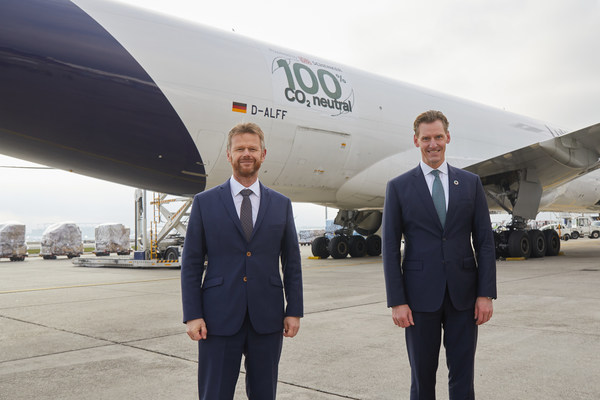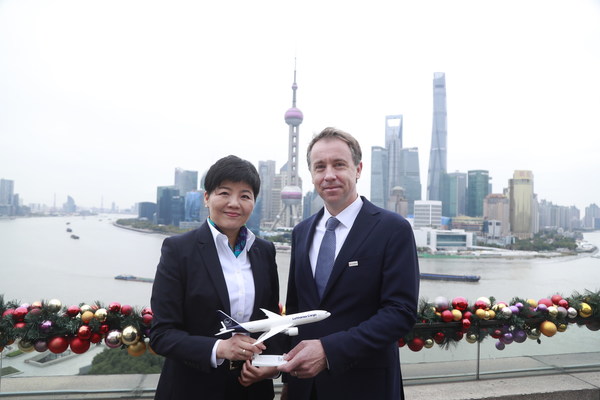SHANGHAI, Dec. 4, 2020 /PRNewswire/ -- 30 November 2020, a cargo flight successfully completed a round trip for the first time in commercial aviation, whose fuel requirements were completely covered by Sustainable Aviation Fuel (SAF). This first CO2-neutral freight flight is made possible by a cooperation between DB Schenker and Lufthansa Cargo. The logistics service provider and the air freight company will transport goods from Siemens Healthineers AG, among others, on this flight. DB Schenker and Lufthansa Cargo are committed to sustainable air transport and agreed in November 2020 to exchange views on environmental issues and to jointly promote them - including the move away from fossil fuels in air freight transport.
"We are already further ahead than many think when it comes to climate protection in air freight. We can demonstrate this with the first CO2-neutral freight flight in history," says Jochen Thewes, CEO of DB Schenker. "With the start of the 2021 summer flight schedule, DB Schenker will offer greenhouse gas-neutral air freight as a regular product. As a logistics provider, DB Schenker is the link between the loading industry and the airlines in order to actually implement climate protection in air freight. I am convinced that there is a great demand for this type of green transport and I am looking forward to seeing who will follow suit," continues Jochen Thewes.
"With this flight we are committed to the increased research and use of SAF so that sufficient quantities of the alternative fuel will be available in the future. In addition to investments in a modern freighter fleet, our commitment to this CO2-neutral flight also contributes to the United Nations' 'Climate Action' sustainability goal. Because Lufthansa Cargo takes its corporate responsibility very seriously and is actively taking measures to meet this responsibility and relieve the environment," explained Peter Gerber, CEO of Lufthansa Cargo.

(Left) Peter Gerber, CEO of Lufthansa Cargo, and Jochen Thewes, CEO of DB Schenker (image source LH Cargo)
"COVID-19 caused an unprecedented market environment and extreme volatility in supply chains. I feel proud that under such circumstances, DB Schenker together with Lufthansa Cargo have continued to prioritize climate protection. We are providing solutions for our customers to offer increasingly empowered consumers the possibility of making low carbon choices. I look forward to seeing more industry partners and customers join us," says Christopher Pollard, CEO of DB Schenker Greater China at an event in Shanghai.
"The first carbon-neutral freighter flight is just the beginning. Together with DB Schenker, we are discussing the operation of even more sustainable flights starting with the 2021 summer schedule. We will continue to commit ourselves to further reduce emissions and to protect our precious environment," explained Janet Mi, China's Chief Representative of Lufthansa Cargo.

(Left) Janet Mi, Chief Representative China, Lufthansa Cargo AG & Christopher Pollard, CEO of DB Schenker Greater China
Sustainable Aviation Fuel (SAF) refers to sustainable, synthetic kerosene. It is currently produced mainly from biomass, for example from sustainable or recyclable vegetable and cooking oils. In future, non-plant-based renewable fuels will also be available. The best-known production process for this is the so-called power-to-liquid concept (PtL) based on renewable electricity, water and CO2.
By using SAF, the fossil CO2 emissions of a flight with conventional kerosene are completely avoided. During combustion in the engine, only CO2 is released that was previously removed from the atmosphere, for example during plant growth. SAF is thus the first real alternative to fossil aviation fuel and the key to climate-friendly, CO2-neutral air traffic.
In addition, DB Schenker and Lufthansa Cargo are also using a reforestation project to compensate for the CO2 emissions and other greenhouse gases that result from the production of the biomass, processing and transport of the SAF. This ensures that the flights are completely greenhouse gas neutral overall.
The SAF used can be added to conventional kerosene as a so-called drop-in fuel and is therefore practical and suitable for everyday use without the need for adjustments to the aircraft and the supply logistics chain. For this reason, a quantity of SAF corresponding to the fuel requirements for the flights from Frankfurt to Shanghai and back is fed into the refueling system at Frankfurt Airport. Each aircraft subsequently refueled from the fuel depot receives and physically consumes a small amount of SAF. However, the CO2 avoidance achieved in this way is credited in full to Lufthansa Cargo and DB Schenker.
This is the first step in a joint effort agreed in November to move away from fossil fuels in aviation. The aim of the cooperation is, among other things, the regular exchange of information, the promotion of environmentally friendly technologies such as SAF. DB Schenker and Lufthansa Cargo combine the start of their first CO2-neutral flights with a call to shippers, logistics providers, airfreight carriers and also politicians to work together on expanding production and infrastructure and thus improving the availability of sustainable aviation fuel. Both companies are leading the way and will regularly offer CO2-neutral air freight as a product for the shipping industry from the summer flight schedule onwards.
About DB Schenker in Greater China
With around 76,900 employees at more than 2,100 locations in over 130 countries, DB Schenker is one of the world's leading logistics providers. DB Schenker has more than 50 years of experience in Greater China with offices established in more than 60 major cities across the country, offering comprehensive supply chain management solutions for efficient air, ocean, rail and land transport as well as contract logistics. We also manage specialized services for trade fairs, projects and global sports events.
Lufthansa Cargo AG
With a turnover of 2.5 billion euros and 8.9 billion revenue tonne-kilometres in 2019, Lufthansa Cargo is one of the world's leading companies in the transport of air freight. The company currently employs about 4,500 people worldwide. Lufthansa Cargo focuses on the airport-to-airport business. The cargo carrier serves around 300 destinations in more than 100 countries with its own fleet of freighters, the belly capacities of passenger aircraft operated by Lufthansa German Airlines, Austrian Airlines, Brussels Airlines, Eurowings and SunExpress, and an extensive road feeder service network. The bulk of the cargo business is routed through Frankfurt Airport. Lufthansa Cargo aligns its corporate responsibility commitment with the sustainability goals of the United Nations (UN). Lufthansa Cargo has committed itself to anchoring five selected sustainability goals in its corporate activities and to making a substantial contribution to achieving these goals by 2030. Lufthansa Cargo is a wholly owned subsidiary of Deutsche Lufthansa AG and the specialist for the logistics business of the Lufthansa Group.